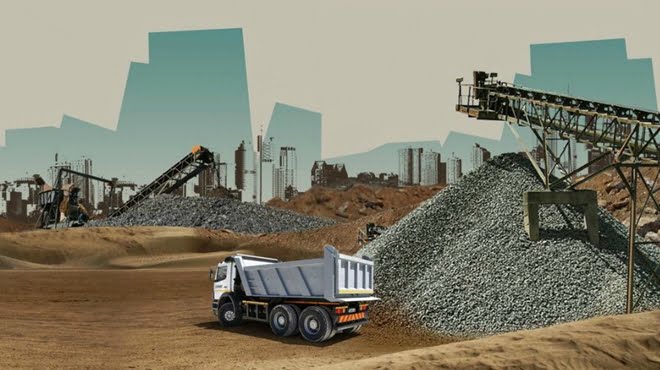Durbanville based aggregates and building materials supply giant Afrimat is bracing for a tough financial year ahead. Afrimat, since listing on the JSE in 2007, has been the envy of the building sector with an unblemished profit track record – thanks mainly to smart acquisitions, an unrelenting focus on costs and flexible production capability.
In its last financial year, Afrimat generated almost R2,2 billion in revenue and made more than R405 million in operating profit at a rock solid margin of over 18%. The company grew earnings by 25% in 2017, meaning an impressive compound annual growth rate of 26% since 2013. In the financial year ahead, however, Afrimat, will be sorely tested in maintaining its growth record.
At a presentation at a recent annual general meeting, CEO Andries van Heerden said the company would pursue a conservative growth strategy while preserving the integrity of the balance sheet.
It does seem that Afrimat will rely on some of its recent acquisitions to drive that profit growth in the short term. He said aggregates producer Infrasors was reaping benefits of improvement initiatives, while newly acquired iron ore and manganese miner Diro was expected to contribute in the second half of the 2018 financial year.
He added that Cape Lime would benefit from marketing efforts, and that the outlook for the Glen Douglas dolomite mine and Clinker Supplies was stable. Van Heerden said Africat was keeping its “eyes wide open in South Africa” with credit terms being strictly monitored and an emphasis on diversifying revenue currencies.
Afrimat’s strength lies in its operational diversity which now spans open pit mining, industrial minerals, aggregates, iron ore, concrete based products, bricks and blocks, readymix concrete, lime and quartzite.
The company operates 25 commercial quarries, three dolomite mines, four clinker facilities and two limestone mines as well as two silica mines, an iron ore mine and five sand and gravel mines. Afrimat also owns nine concrete brick and block factories and 16 readymix batching sites.
Van Heerden said this operational profile generated a balanced and consistent income stream.
“We are hedged against economic volatility through wide diversification. The operational contribution is interesting to breakdown. In financial 2016 the clinker segment accounted for 38% of Afrimat’s business, the Glen Douglas dolomite mines 18% and the traditional aggregates business 32%. But in financial 2017 the traditional aggregates division accounted for 44% of Afrimat’s business, the clinker segment 23%, Glen Douglas 18%, Infrasors 12% and Cape Lime 8%. The financial year ahead will be interesting to gauge with Cape Lime set to make a bigger contribution and the newly acquired iron ore operations set to chip into profits.”
Vunani Securities analyst Anthony Clark pointed out that while the early benefits from the Cape Lime acquisition were already accruing, “it will be more of a 2018/19 story than present”.
He said the Diro iron ore acquisition was also progressing well and is ahead of target. But he pointed out that Afrimat management had cautioned against placing too much earnings power on this situation in the financial year ahead.
Van Heerden believed that Afrimat’s fundamental understanding of its various markets – coupled with a good understanding of own abilities and a continuous research of business environment – positioned the company well for the tough trading period ahead.
He noted that spending on smaller infrastructure and services projects remained in place, and that road maintenance and development remained a focus for government and SANRAL (SA National Roads Agency). He added that an increasing environmental focus – clean water and clean air – could benefit Afrimat as well.
An uptick in mining activity (and commodity prices) would certainly help the new iron ore operations as well.
